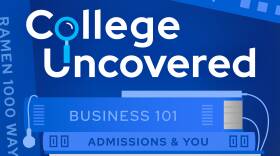Amid uncertainty, some colleges brace for more cuts
Even selective colleges like Yale say they have to trim their budgets.
Podcast: College Uncovered
-
Election Year Edition: The Politics of College
College Uncovered Season 3 is coming! First episode drops on Thursday, September 12th. In our first two seasons, GBH and The Hechinger Report explored the business of college admissions and paying for your education. Now we’re back with a special election year season, helping you navigate the politics of American colleges and universities.College Uncovered is hosted by Kirk Carapezza and Jon Marcus, journalists with decades of experience who specialize in covering higher education in the U.S. They offer students and their families an unvarnished look at a uniquely American system, so YOU can make fully informed choices.One episode will drop weekly and will be available wherever you listen to podcasts. -
[Bonus]: Dear College - Tayana Antoine
The essay is a vital piece in the college application puzzle; portraying the strengths and challenges of aspiring high school students. In this bonus episode of "College Uncovered," Tayana Antoine describes for the producers of the "Dear College" podcast, the similarities between a teen mom and an older sister. How her dual role as caretaker for her siblings and maturing adult sometimes can clash but also brings her much delight.Learn more about the Dear College podcast here: www.dearcollegepodcast.org -
[Bonus]: Dear College - Jenessa Otabor
College application essays demonstrate literacy and creativity of high school students striving for higher education. As the producers of the "Dear College" podcast have found, what this rising generation says about themselves says a lot about all of us. In this bonus episode of "College Uncovered," Jenessa Otabor shares how a recent educational opportunity turned from stressful to rewarding; once she learned how to speak up for herself. Learn more about the Dear College podcast here: www.dearcollegepodcast.org -
S2 Eps 8 - What do college students learn, anyway?
While there are a lot of tests to get into college, there are no exit exams to get out. Despite the soaring price of tuition and the benefits a degree offers, researchers have found that undergrads often spend little time studying compared to other activities like working, socializing or partying. As a result, many show limited gains in critical thinking — the hallmark of American higher education. -
S2 Eps 7 - Junk Fees
Students at one New York university have a surprise awaiting them: an $8,000-a-year “academic excellence fee.” We have to ask: Isn’t academic excellence included in tuition? In fact, tuition is only part of the cost of college. Like car dealerships, schools are nickel-and-diming consumers with huge fees — fees for student activities, fees for athletics, fees for building maintenance, fees for libraries, even fees for graduation, the bills for which arrive just as students and their families thought they were finally done paying for college.













